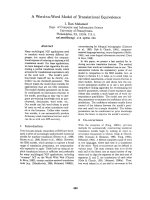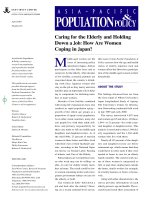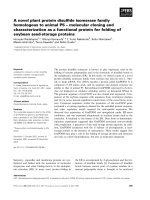The Lady and Sada San A Sequel to The Lady of the Decoration potx
Bạn đang xem bản rút gọn của tài liệu. Xem và tải ngay bản đầy đủ của tài liệu tại đây (366.94 KB, 100 trang )
The Lady and Sada San
Frances Little
The Lady and Sada San
A Sequel to
The Lady of the Decoration
By
Frances Little
1912
TO
ELLEN CHURCHILL SEMPLE
AND
CHARLOTTE SMITH
MY FELLOW WANDERERS THROUGH THE ORIENT
The Lady and Sada San
1
ON THE HIGH SEAS. June, 1911.
Mate:
You once told me, before you went to Italy, that after having been
my intimate relative all these years, you had drawn a red line
through the word surprise. Restore the abused thing to its own at
once. You will need it when the end of this letter is reached. I have
left Kentucky after nine years of stay-at-home happiness, and once
again I am on my way to Japan—this time in wifely disobedience to
Jack’s wishes.
What do you think that same Jack has “gone and done”! Of course
he is right. That is the provoking part of Jack; it always turns out that
he is in the right. Two months ago he went to some place in China
which, from its ungodly name, should be in the furthermost parts of
a wilderness. Perhaps you have snatched enough time from
guarding the kiddies from a premature end in Como to read a
headline or so in the home papers. If by some wonderful chance,
between baby prattle, bumps and measles, they have given you a
moment’s respite, then you know that the Government has grown
decidedly restless for fear the energetic and enterprising bubonic or
pneumonic germ might take passage on some of the ships from the
Orient. So it is fortifying against invasion. The Government,
knowing Jack’s indomitable determination to learn everything
knowable about the private life and character of a given germ, asked
him to join several other men it is sending out to get information,
provided of course the germ doesn’t get them first.
Jack read me the official-looking document one night between puffs
of his after-dinner pipe.
Another surprise awaits you. For once in my life I had nothing to
say. Possibly it is just as well for the good of the cause that the
honorable writer of the letter could not see how my thoughts looked.
I glanced about our little den, aglow with soft lights; everything in it
seemed to smile. Well, as you know it, Mate, I do not believe even
you realize the blissfulness of the hours of quiet comradeship we
have spent there. With the great know-it-all old world shut out, for
joyful years we have dwelt together in a home-made paradise. And
The Lady and Sada San
2
yet it seemed just then as if I were dwelling in a home-made Other
Place.
The difference in the speed of time depends on whether love is your
guest or not.
The thought of the briefest interruption to my content made me feel
like cold storage. A break in happiness is sometimes hard to mend.
The blossom does not return to the tree after the storm, no matter
how beautiful the sunshine; and the awful fear of the faintest echo of
past sorrow made my heart as numb as a snowball. To the old terror
of loneliness was added fear for Jack’s safety. But I did not do what
you naturally would prophesy. After seeing the look on Jack’s face I
changed my mind, and my protest was the silent kind that says so
much. It was lost! Already Jack had gone into one of his trances, as
he does whenever there is a possibility of bearding a brand-new
microbe in its den, whether it is in his own country or one beyond
the seas. In body he was in a padded chair with all the comforts of
home and a charming wife within speaking distance. In spirit he was
in dust-laden China, joyfully following the trail of the wandering
germ. Later on, when Jack came to, we talked it over. I truly
remembered your warnings on the danger of impetuosity; for I
choked off every hasty word and gave my consent for Jack to go.
Then I cried half the night because I had.
We both know that long ago Jack headed for the topmost rung of a
very tall scientific ladder. Sometimes my enthusiasm as chief booster
and encourager has failed, as when it meant absence and risk.
Though I have known women who specialized in renunciation, till
they were the only happy people in the neighborhood, its charms
have never lured me into any violent sacrifice. Here was my chance
and I firmly refused to be the millstone to ornament Jack’s neck.
You might know, Mate? I was hoping all the time that he would find
it quite impossible to leave such a nice biddable wife at home. But I
learn something new about Jack every day. After rather heated
discussion it was decided that I should stay in the little home. That
is, the heat and the discussion was all on my side. The decision lay in
the set of Jack’s mouth, despite the tenderness in his eyes. He
thought the risks of the journey too great for me; the hardships of the
rough life too much. Dear me! Will men never learn that hardship
and risk are double cousins to loneliness, and not even related to
love by marriage?
The Lady and Sada San
3
But just as well paint on water as to argue with a scientist when he
has reached a conclusion.
Besides, said Jack, the fatherly Government has no intention that
petticoats, even hobbled ones, should be flitting around while the
habits and the methods of the busy insect were being examined
through a microscope or a telescope. The choice of instrument
depending, of course, upon the activity of the bug.
Black Charity was to be my chief-of-police and comforter-in-general.
Parties—house, card and otherwise—were to be my diversion, and I
was to make any little trips I cared for. Well, that ‘s just what I am
doing. Of course, there might be a difference of opinion as to
whether a journey from Kentucky to Japan is a little trip.
I am held by a vague uneasiness today. Possibly it ‘s because I am
not certain as to Jack’s attitude, when he learns through my letter,
which is sailing along with me, that I am going to Japan to be as near
him as possible. I hope he will appreciate my thoughtfulness in
saving him all the bother of saying no. Or it might be that my
slightly dampened spirits come from the discussion I am still having
with myself whether it ‘s the part of a dutiful wife to present herself
a wiggling sacrifice to science, or whether science should attend to
its own business and lead not into temptation the scientifically
inclined heads of peaceful households.
You ‘ll say the decision of what was best lay with Jack. Honey, there
‘s the error of your mortal mind! In a question like that my spouse is
as one-sided as a Civil War veteran. Say germ-hunt to Jack and it ‘s
like dangling a gaudy fly before a hungry carp.
I saw Jack off at the station, and went hack to the little house. Charity
had sent the cook home and with her own hands served all the
beloved dainties of my long-ago childhood, trying to coax me into
forgetfulness. As you remember, Mate, dinner has always been the
happiest hour of the day in our small domain. Now? Well,
everything was just the same. The only difference was Jack. And the
half circle of bare tablecloth opposite me was about as cheerful as a
snowy afternoon at the North Pole. I wandered around the house for
awhile, but every time I turned a corner there was a memory waiting
to greet me. Now the merriest of them seemed to be covered with a
chilly shadow, and every one was pale and ghostly. All night I lay
awake, playing at the old game of mental solitaire and keeping tryst
The Lady and Sada San
4
with the wind which seemed to tap with unseen fingers at my
window and sigh,
“Then let come what come may
. . . .
I shall have had my day. “
Is it possible, Mate, that my glorious day, which I thought had barely
tipped the hour of noon, is already lengthening into the still shadows
of evening?
It was foolish but, for the small comfort I got out of it, I turned on the
light and looked inside my wedding-ring. Time has worn it a bit but
the letters which spell “My Lady of the Decoration, “ spelled again
the old-time thrill into my heart.
What ‘s the use of tying your heartstrings around a man, and then
have ambition slip the knot and leave you all a-quiver?
Far be it from me to stand in Jack’s way if germ-stalking is necessary
to his success. Just the same, I could have spent profitable moments
reading the burial service over every microbe, home-grown and
foreign.
Really, Mate, I ‘ve conscientiously tried every plan Jack proposed
and a few of my own. It was no use. That day-after-Christmas feeling
promptly suppressed any effort towards contentment.
At first there was a certain exhilaration in catching pace with the gay
whirl which for so long had been passed by for homier things. You
will remember there was a time when the pace of that same whirl
was never swift enough for me; but my taste for it now was gone,
and it was like trying to do a two-step to a funeral march. For once in
my life I knew the real meaning of that poor old worn-to-a-frazzle
call of the East, for now the’ dominant note was the call of love.
I heard it above the clink of the teacups. It was in the swish of every
silk petticoat. If I went to the theater, church or concert, the call of
that germ-ridden spot of the unholy name beat into my brain with
the persistency of a tom-tom on a Chinese holiday.
The Lady and Sada San
5
Say what you will, Mate, it once took all my courage to leave those I
loved best and go to far-away Japan. Now it required more than I
could dig up to stay—with the best on the other side of the Pacific.
The struggle was easy and swift. The tom-tom won and I am on my
way to be next-door neighbor to Jack. Those whom it concerned here
were away from home, so I told no one good-by, thus saving
everybody so much wasted advice. If there were a tax on advice the
necessities of life would not come so high. Charity followed me to
the train, protesting to the last that “Marse Jack gwine doubt her
velocity when she tell him de truf bout her lady going a-gaddin’ off
by herse’f and payin’ no mind to her ole mammy’s prosterations. “ I
asked her to come with me as maid. She refused; said her church was
to have an ice-cream sociable and she had “to fry de fish. “ This letter
will find you joyfully busy with the babies and the “only man. “
Blest woman that you are.
But I know you. I have a feeling that you have a few remarks to
make. So hurry up. Let us get it off our minds. Then I can better tell
you what I am doing. Something is going to happen. It usually does
when I am around. I have been asked to chaperone a young girl
whose face and name spell romance. If I were seeking occupation
here is the opportunity knocking my door into splinters.
The Lady and Sada San
6
STILL AT SEA. June, 1911.
Any time you are out of a job and want to overwork all your
faculties and a few emotions, try chaperoning a young room-mate
answering to the name of Sada San, who is one-half American dash,
and the other half the unnamable witchery of a Japanese woman; a
girl with the notes of a lark in her voice when she sings to the soft
twang of an old guitar.
If, too, you are seeking to study psychological effect of such a
combination on people, good, middlin’ and otherwise, I would
suggest a Pacific liner as offering fifty-seven varieties, and then
some.
The last twinge of conscience I had over coming, died a cheerful
death. I ‘d do it again. For not only is romance surcharging the air,
but fate gives promise of weaving an intricate pattern in the story of
this maid whose life is just fairly begun and whom the luck of the
road has given me as traveling mate. Now, remembering a few biffs
fate has given me, I have no burning desire to meddle with her
business. Neither am I hungering for responsibility. But what are
you going to say to yourself, when a young girl with a look in her
eyes you would wish your daughter to have, unhesitatingly gives
you a letter addressed at large to some “Christian Sister”! You read it
to find it’s from her home pastor, requesting just a little
companionship for “a tender young soul who is trying her wings for
the first time in the big and beautiful world”! I have a very private
opinion about reading my title clear to the Christian Sister business,
but no woman with a heart as big as a pinch of snuff could resist
giving her very best and much more to the slip of a winsome maid,
who confidingly asks it—especially if the sister has any knowledge
of the shadows lurking in the beautiful world.
Mate, these steamers as they sail from shore to shore are like giant
theaters. Every trip is an impromptu drama where comedy, farce,
and often startling tragedy offer large speaking parts. The revelation
of human nature in the original package is funny and pathetic.
Amusement is always on tap and life stories are just hanging out of
the port-hole waiting to attack your sympathy or tickle your funny
bone. But you ‘d have to travel far to find the beginning of a story so
heaped up with romantic interest as that of Sada San as she told it to
me, one long, lazy afternoon as I lay on the couch in my cabin,
The Lady and Sada San
7
thanking my stars I was getting the best of the bare tablecloth and
the empty house at home.
Some twenty years ago Sada’s father, an American, grew tired of the
slow life in a slow town and lent ear to the fairy stories told of the
Far East, where fortunes were made by looking wise for a few
moments every morning and devoting the rest of the day to
samisens and flutes. He found the glorious country of Japan. The
beguiling tea-houses, and softly swinging sampans were all too
distracting. They sang ambition to sleep and the fortune escaped.
He drifted, and at last sought a mean existence as teacher of English
in a school of a remote seaside village. His spirit broke when the
message came of the death of the girl in America who was waiting
for him. Isolation from his kind and bitter hours left for thought
made life alone too ghastly. He tried to make it more endurable by
taking the pretty daughter of the head man of the village as his wife.
My temperature took a tumble when I saw proofs of a hard and fast
marriage ceremony, signed and counter-signed by a missionary
brother who meant business.
You say it is a sordid tale? Mate, I know a certain spot in this Land of
Blossoms, where only foreigners are laid to rest, which bears
testimony to a hundred of its kind—strange and pitiful destinies
begun with high and brilliant hopes in their native land; and when
illusions have faded, the end has borne the stamp of tragedy,
because suicide proved the open door out of a life of failure and
exile.
Sada’s father was saved suicide and long unhappiness by a timely
tidal-wave, which swept the village nearly bare, and carried the man
and his wife out to sea and to eternity.
The child was found by Susan West who came from a neighboring
town to care for the sick and hungry. Susan was a teacher-
missionary. Not much to look at, if her picture told the truth, but
from bits of her history that I ‘ve picked up her life was a brighter
jewel than most of us will ever find in a heavenly crown. Instead of
holding the unbeliever by the nape of the neck and thrusting a not-
understood doctrine down his unwilling throat, she lived the simple
creed of loving her neighbor better than herself. And the old pair of
The Lady and Sada San
8
goggles she wore made little halos around the least speck of good
she found in any transgressor, no matter how warped with evil.
When she was n’t helping some helpless sinner to see the rainbow of
promise at the end of the straight and narrow way, Susan spent her
time and all her salary, giving sick babies a fighting chance for life.
She took the half-drowned little Sada home with her, and searched
for any kinsman left the child. There was only one, her mother’s
brother. He was very poor and gladly gave his consent that Miss
West should keep the child—as long as it was a girl! Susan had
taught the man English once in the long ago and this was his chance
to repay her.
Later on when the teacher found her health failing and headed for
home in America, Uncle Mura was still more generous and raised no
objections to her taking the baby with her.
Together they lived in a small Western town. The missionary reared
the child by rule of love only and went on short rations to educate
her. Sada’s eager mind absorbed everything offered her like a young
sponge, and when a few months ago Susanna folded her hands and
joined her foremothers, there was let loose on the world this
exquisite girl with her solitary legacy of untried ideals and a blind
enthusiasm for her mother’s people.
Right here, Mate, was when I had a prolonged attack of cold shivers.
Just before Miss West passed along, knowing that the Valley was
near, she wrote to Uncle in Japan and told him that his niece would
soon he alone. Can’t you imagine the picture she drew of her foster
child who had satisfied every craving of her big mother heart?
Fascinating and charming and so weighted with possibilities, that
Mura, who had prospered, leaped for his chance and sent Sada San
money for the passage over.
Not a mite of anxiety shadowed her eyes when she told me that
Uncle kept a wonderful tea-house in Kioto. He must be very rich, she
thought, because he wrote her of the beautiful things she was to
have. About this time the room seemed suffocating. I got up and
turned on the electric fan. The only thing required of her, she
continued, was to use her voice to entertain Uncle’s friends. But she
hoped to do much more. Through Miss West she knew how many of
her mother’s dear people needed help. How glorious that she was
young and strong and could give so much. Susan had also talked to
The Lady and Sada San
9
her of the flowers, the lovely scenery, the poetry of the people and
their splendid spirit—making a dreamland where even man was
perfect. How she loved it! How proud she was to feel that in part it
was her country. Faithfully would she serve it. Oh, Susanna West! I
‘d like to shake you till your harp snapped a string. It ‘s like sending
a baby to pick flowers on the edge of a bottomless pit.
What could I say! The missionary-teacher had told the truth. She
simply failed to mention that in the fairy-land there are cherry-
blossom lanes down which no human can wander without being
torn by the brier patches.
The path usually starts from a wonderful tea-house where Uncles
have grown rich. Miss West didn’t mean to shirk her duty. In most
things the begoggled lady was a visionary with a theory that if you
don’t talk about a thing it does not exist; and like most of her kind
she swept the disagreeables into a dust heap and made for the high
places where all was lovely. And yet she had toiled with the girl
through all the difficulties of the Japanese language; and, to give her
a musical education, had pinched to the point of buying one hat in
eight years!
Now it is all done and Sada is launched on the high seas of life with
a pleasure-house for a home and an unscrupulous Uncle with
unlimited authority for a chaperon. Shades of Susan! but I am
hoping guardian angels are “really truly, “ even if invisible.
Good night, Mate. This game of playing tag with jarring thoughts,
new and old, has made six extra wrinkles. I am glad I came and you
and Jack will have to be, for to quote Charity, “I ‘se done resoluted
on my word of honah” to keep my hands, if possible, on Sada whose
eyes are as blue as her hair is black.
The Lady and Sada San
10
PACIFIC OCEAN.
Since morning the sea has been a sheet of blue, streaked with the
silver of flying fish. That is all the scenery there is; not a sail nor a
bird nor an insect. Either the unchanging view or something in the
air has stimulated everybody into being their nicest. It is surprising
how quickly graciousness possesses some people when there is a
witching girl around. Vivacious young men and benevolent officers
have suddenly appeared out of nowhere, spick and span in white
duck and their winningest smiles. Entertainments dovetail till there
is barely time for change of costume between acts.
But let me tell you, Mate, living up to being a mother is no idle
pastime, particularly if it means reviving the lost art of managing
love-smitten youths and elderly male coquettes. There is a specimen
of each opposite Sada and me at table who are so generous with their
company on deck, before and after meals, I have almost run out of
excuses and am short on plans to avoid the heavy obligations of their
eager attentions.
The youth is a To-Be-Ruler of many people, a Maharajah of India.
But the name is bigger than the man. Two years ago his father
started the boy around the world with a sack full of rubles and a
head full of ancient Indian lore. With these assets he paused at
Oxford that he might skim through the classics. He had been told
this was where all the going-to-be-great men stopped to acquire just
the proper tone of superiority so necessary in ruling a country. Of
course he picked up a bit on electricity, mechanics, etc. This
accomplished to his satisfaction he ran over to America to view the
barbarians’ god of money and take a glance at their houses which
touched the sky. But his whole purpose in living, he told me, was to
yield himself to certain meditations, so that in his final reincarnation,
which was only a few centuries off, he would return to the real thing
in Buddha. In the meantime he was to be a lion, a tiger and a little
white bird. At present he is plain human, with the world-old malady
gnawing at his heart, a pain which threatens to send his cogitations
whooping down a thornier and rosier lane than any Buddha ever
knew. Besides I am thinking a few worldly vanities have crept in and
set him hack an eon or so. He wears purple socks, pink ties and a
dainty watch strapped around his childish wrist.
The Lady and Sada San
11
When I asked him what impressed him most in America, he
promptly answered with his eyes on Sada, “Them girls. They are
rapturous! “
Farewell Nirvana! With a camp stool in one hand and a rosary in the
other, he follows Sada San like the shadow on a sun dial. Wherever
she is seated, there is the stool and the royal youth, his mournful
eyes feasting on the curves and dimples of her face, her lightest jest
far sweeter than any prayer, the beads in his hand forgotten.
The other would-be swain calls himself a Seeker of Truth.
Incidentally he is hunting a wife. His general attitude is a constant
reminder of the uncertainty of life. His presence makes you glad that
nothing lasts. He says his days are heavy with the problems of the
universe, but you can see for yourself that this very commercial
traveler carries a light side line in an assortment of flirtations that
surely must be like dancing little sunbeams on a life of gloom.
Goodness knows how much of a nuisance he would be if it were not
for a little lady named Dolly, who sits beside him, gray in color,
dress and experience. At no uncertain age she has found a belated
youthfulness and is starting on the first pleasure trip of her life.
Coming across the country to San Francisco, her train was wrecked.
In the smash-up a rude chair struck her just south of the belt line and
she fears brain fever from the blow. The alarm is not general, for
though just freed by kind death from an unhappy life sentence of
matrimony she is ready to try another jailer.
Whether he spied Dolly first and hoped that the gleam from her
many jewels would light up the path in his search for Truth and a
few other things, or whether the Seeker was sought, I do not know.
However the flirtation which seems to have no age limit has
flourished like a bamboo tree. For once the man was too earnest.
Dolly gave heed and promptly attached herself with the persistency
of a barnacle to a weather-beaten junk. By devices worthy a finished
fisher of men, she holds him to his job of suitor, and if in a moment
of abstraction his would-be ardor for Sada grows too perceptible, the
little lady reels in a yard or so of line to make sure her prize is still
dangling on the hook.
To-day at tiffin the griefless widow unconsciously scored at the
expense of the Seeker, to the delight of the whole table. For Sada’s
The Lady and Sada San
12
benefit this man quoted a long passage from some German
philosopher. At least it sounded like that. It was far above the little
gray head he was trying to ignore and so weighty I feared for her
mentality. But I did not know Dolly. She rose like a doughnut.
Looking like a child who delights in the rhythm of meaningless
sounds, she heard him through, then exclaimed with breathless
delight, “Oh, ain’t he fluid! “
The man fled, but not before he had asked Sada for two dances at
night.
It is like a funny little curtain-raiser, with jealousy as a gray-haired
Cupid. So far as Sada is concerned, it is admiration gone to waste.
Even if she were not gaily indifferent, she is too absorbed in the
happy days she thinks are awaiting her. Poor child! Little she knows
of the limited possibilities of a Japanese girl’s life; and what the effect
of the painful restrictions will be on one of her rearing, I dare not
think.
Once she is under the authority of Uncle, the Prince, the Seeker, and
all mankind will be swept into oblivion; and, until such time as she
can be married profitably and to her master’s liking, she will know
no man. The cruelest awakening she will face is the attitude of the
Orient toward the innocent offspring in whose veins runs the blood
of two races, separated by differences which never have been and
never will be overcome.
In America the girl’s way would not have been so hard because her
novel charm would have carried her far. But hear me: in Japan, the
very wave in her hair and the color of her eyes will prove a barrier to
the highest and best in the land. Even with youth and beauty and
intelligence, unqualified recognition for the Eurasian is as rare as a
square egg.
Another thought hits me in the face as if suddenly meeting a cross
bumblebee. Will the teachings of the woman, who lived with her
head in the clouds, hold hard and fast when Uncle puts on the
screws?
The Seeker says it is the fellow who thinks first that wins. He speaks
feelingly on the subject. Right now I am going to begin cultivating
first thought, and try to be near if danger, whose name is Uncle,
The Lady and Sada San
13
threatens the girl who has walked into my affections and made
herself at home.
The Lady and Sada San
14
Later.
All the very good people are in bed. The very worldly minded and
the young are on deck reluctantly finishing the last dance under a
canopy of make-believe cherry blossoms and wistaria. I am on the
deck between, closing this letter to you which I will mail in
Yokohama in a few hours.
In a way I shall be glad to see a quiet room in a hotel and hie me
back to simple living, free from the responsibilities of a temporary
parent. I am not promising myself any gay thrills in the meantime.
What ‘s the use, with Jack on the borderland of a sulphurous country
and you in the Garden of Eden? His letters and yours will be my
greatest excitement. So write and keep on writing and never fear that
I will not do the same. You are the safety-valve for my speaking
emotions, Mate; so let that help you bear it.
Please mark with red ink one small detail of Sada’s story. When I
was fastening her simple white gown for the dance her chatter was
like that of a sunny-hearted child. Indeed, she liked to dance. Susan
did not think it harmful. She said if your heart was right your feet
would follow. When Miss West could spare her she always went to
parties with Billy, and oh, how he could dance if he was so big and
had red hair.
So! there was a Billy? I looked in her face for signs. The way was
clear but there was a soft little quiver in her voice that caused me
carefully to label the unknown William, and lay him on a shelf for
future reference. Whatever the coming days hold for her, mine has
been the privilege of giving the girl three weeks of unclouded
happiness.
Outside I hear the little Prince pacing up and down, yielding up his
soul to holy meditations. I ‘d be willing to wager my best piece of
jade his contemplations are something like a cycle from Nirvana, and
closer far to a pair of heavily fringed eyes. Poor little imitation
Buddha! He is grasping at the moon’s reflection on the water.
Somewhere near I hear Dolly’s soft coo and deep-voiced replies. But
unfinished packing, a bath and coffee are awaiting me.
Dawn is coming, and already through the port hole I see a dot of
earth curled against the horizon. Above floats Fuji, the base wrapped
The Lady and Sada San
15
in mists, the peak eternally white, a giant snowdrop swinging in a
dome of perfect blue. The vision is a call to prayer, a wooing of the
soul to the heights of undimmed splendor.
After all, Mate, I may give you and Jack a glad surprise and justify
Sada handing me that letter addressed to a Christian Sister.
The Lady and Sada San
16
YOKOHAMA, July, 1911.
Now that I am here, I am trying to decide what to do with myself. At
home each day was so full of happy things and the happiest of all
was listening for Jack’s merry whistle as he opened the street door
every night. At home there are always demands, big and little,
popping in on me which I sometimes resent and yet being free from
makes me feel as dismal as a long vacant house with the For Rent
sign up, looks. In this Lotus land there is no must of any kind for the
alien, and the only whistles I hear belong to the fierce little tugs that
buzz around in the harbor, in and out among the white sails of the
fishing fleet like big black beetles in a field of lilies. But you must not
think life dull for me. Fate and I have cried a truce, and she is
showing me a few hands she is dealing other people. But first listen
to the tale I have to tell of the bruise she gave my pride this morning,
that will show black for many a day.
I joined a crowd on the water ‘s edge in front of the hotel to watch a
funeral procession in boats. Recently a hundred and eighty
fishermen were sent to the bottom by a big typhoon, and the wives
and the sweethearts were being towed out to sea to pay a last tribute
to them, by strewing the fatal spot with flowers and paper prayers.
White-robed priests stood up in the front of the boats and chanted
some mournful ritual, keeping time to the dull thumping of a drum.
The air was heavy with incense. A dreamy melancholy filled the air
and I thought how hallowed and beautiful a thing is memory. From
out that silent watching crowd came a voice that sent my thoughts
flying to starry nights of long ago and my first trip across the Pacific;
soft south winds; vows of eternal devotion that kept time with the
distant throbbing of a ship’s engine. I fumed. I was facing little
Germany and five littler Germanys strung out behind. You surely
remember him? and how when I could n’t see things his way he
swore to a wrecked heart and a never-to-be-forgotten constancy.
Mate! There was no more of a flicker of memory in the stare of his
round blue eyes than there would have been in a newly baked
pretzel. I stood still, waiting for some glimmer of recognition.
Instead, he turned to the pincushion on his arm, whom I took to be
Ma O., and I heard him say “Herzallorliebsten. “ I went straight to
the hotel and had it translated. Thought it had a familiar sound.
Would n’t it be interesting to know how many “only ones” any
man’s life history records? To think of my imagining him eating his
heart out with hopeless longing in some far away Tibetan
The Lady and Sada San
17
Monastery. And here he was, pudgy and content, with his fat little
brood waddling along behind him. If our vision could penetrate the
future, verily Romance would have to close up shop. Oh, no! I did
n’t want him to pine entirely away, but he needn’t have been in such
an everlasting hurry to get fat and prosperous over it. Would n’t Jack
howl?
I took good care to see that he was not stopping at this hotel. Then I
went back to my own thoughts of the happy years that had been
mine since Little Germany bade me a tearful good-by.
And, too, I wanted to think out some plan whereby I can keep in
touch with Sada and be friendly with her relative.
Before I left the steamer, I had a surprise in the way of Uncles. Next
time I will pause before I prophesy. But if Uncle was a blow to my
preconceived ideas, I will venture Sada startled a few of his
traditions as to nieces. Quarantine inspection was short, and when at
last we cast anchor, the harbor was as blue as if a patch of the
summer sky had dropped into it. The thatched roofs shone russet
brown against the dark foliage of the hills. The temple roofs curved
gracefully above the pink mist of the crepe myrtle.
Sada was standing by me on the upper deck, fascinated by the
picture. As she realized the long dreamed-of fairy-land was
unfolding before her, tears of joy filled her eyes and tears of another
kind filled mine.
Sampans, launches and lighters clustered around the steamer as
birds of prey gather to a feast: captains in gilt braid; coolies in blue
and white, with their calling-cards stamped in large letters on their
backs, and the story of their trade written around the tail of their
coats in fantastic Japanese characters. Gentlemen in divided skirts
and ladies in kimono and clogs swarmed up the gangway. In the
smiling, pushing crowd I looked for the low-browed relative I
expected to see. Imagine the shock, Mate, when a man with manners
as beautiful as his silk kimono presented his card and announced
that he was Uncle Mura. I had been pointed out as Sada’s friend. A
week afterwards I could have thought of something brilliant to say.
Taken unawares, I stammered out a hope that his honorable teeth
were well and his health poor. You see I am all right in Japanese if I
do the talking. For I know what I want to say and what they ought to
say. But when they come at me with a flank movement, as it were, I
The Lady and Sada San
18
am lost. Uncle passed over my blunder without a smile and went on
to say many remarkable things, if sound means anything. However,
trust even a deaf woman to prick up her ears when a compliment is
headed her way, whether it is in Sanskrit or Polynesian. In
acknowledgment I stuck to my flag, and the man’s command of
quaint but correct English convinced me that I would have to
specialize in something more than first thought if I was to cope with
this tea-house proprietor whose armor is the subtle manners of the
courtier.
Blessed Sada! Only the cocksureness of youth made her blind to the
check her enthusiasm was meant to receive in the first encounter of
the new life. She had always met people on equal terms, most men
falling easy victims. She was blissfully ignorant that Mura, by
directing his conversation to me, meant to convey to her that well-
bred girls in this enchanted land lowered their eyes and folded their
hands when they talked in the presence of a MAN, if they dared to
talk at all.
Not so this half-child of the West. She fairly palpitated with joy and
babbled away with the freedom of a sunny brook in the shadow of a
grim forest. From the man’s standpoint, he was not unkind;
unrestraint was to him an incomprehensible factor in a young girl’s
make-up; and whatever was to follow, the first characters he meant
her to learn must spell reverence and repression.
They hurried ashore to catch a train to Kioto. I must look harmless,
for I was invited to call. I shall accept, for I have a feeling in spite of
manners and silken robes that the day is not distant when the
distress signals will be flying.
I waved good-by to the girl as the little launch made its way to land.
She made a trumpet of her hands and called a merry “sayonara. “
The master of her future folded his arms and looked out to sea.
The next day I had a lonely lunch at the hotel. When I saw two
lovery young things at the table where Jack and I had our wedding
breakfast, so long ago, I made for the other end of the room and
persistently turned my back. But I saw out of the corner of my eye
they were far away above food, and, Mate, believe me, they did n’t
even know it was hot, though a rain barrel couldn’t have measured
the humidity.
The Lady and Sada San
19
Of course Jack and I were much more sensible, but that whole
blessed time is wrapped in rosy mists with streaks of moonlight to
the tune of heavenly music, so it ‘s futile to try to recall just what did
happen. I ought to have gone to another hotel, but the chain of
memory was too strong for me.
I was hesitating between the luxury of a sentimental spell and a fit of
loneliness, when a happy interruption came in a message from
Countess Otani, naming the next day at two for luncheon with her at
the Arsenal Gardens at Tokio. How I wished for you, Mate! It was a
fairy-story come true, dragons and all. The Arsenal Garden means
just what it says. Only when the dove of peace is on duty are its
gates opened, and then to but a few, high in command. For across
the white-blossomed hedge that encloses the grounds, armies of men
toil ceaselessly molding black bullets for pale people and they work
so silently that the birds keep house in the long fringed willows and
the goldfish splash in the sunned spots of the tiny lake.
After passing the dragons in the shape of sentries and soldiers, to
each of whom I gave a brief life-history, I wisely followed my nose
and a guard down the devious path.
The Countess received her guests in a banquet-hall all ebony and
gold, and was not seated permanently on a throne with a diamond
crown screwed into her head as we used so fondly to imagine.
The simplicity of her hospitality was charming. She and most of her
ladies-in-waiting had been educated abroad. But despite the lure of
the Western freedom, they had returned to their country with their
heads level and their traditions intact. But you guess wrong, honey,
if you imagine custom and formality of official life have so overcome
these high-born ladies as to make them lay figures who dare not
raise their eyes except by rule. There were three American guests,
and only by being as nimble as grasshoppers did we hold our own in
the table talk which was as exhilarating as a game of snowball on a
frosty day.
We scampered all around war and settled a few important political
questions. Poetry, books and the new Cabinet vied with the
merriment over comparisons in styles of dress. One delightful
woman told how gloves and shoes had choked her when she first
wore them in America. Another gave her experience in getting









